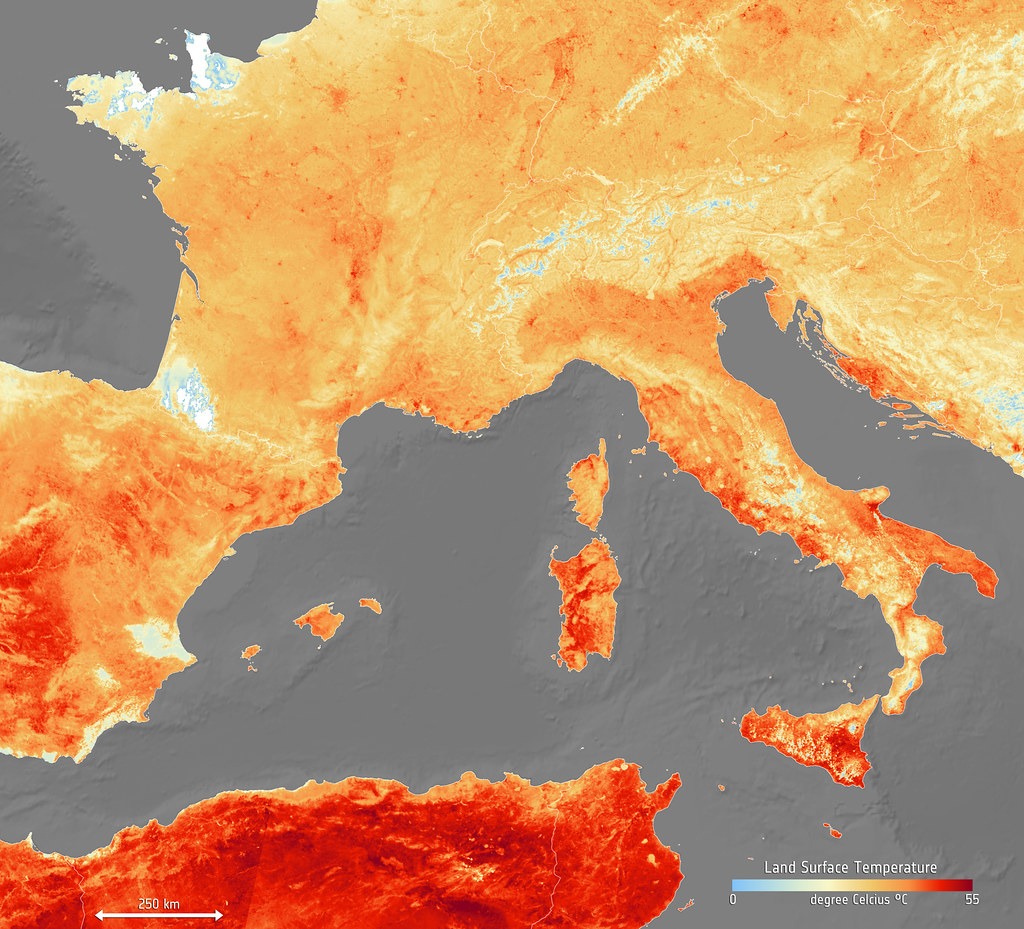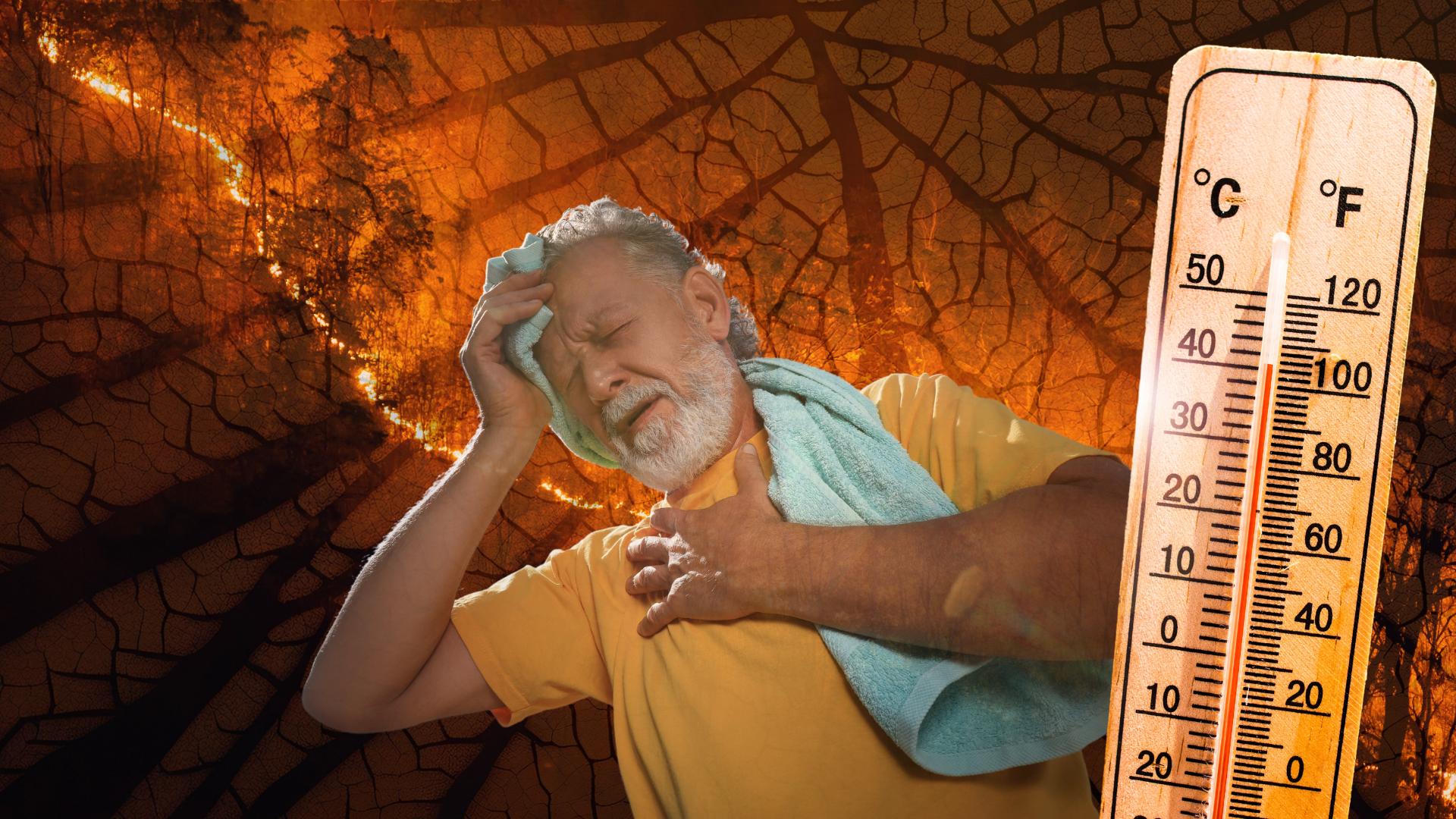You have probably encountered news about heat waves or talked to someone about how hot this summer is. Due to climate change, extreme weather events occur worldwide, and heatwaves are one of them. Briefly explained heat waves are unusual hot weather in a certain period of time, sometimes accompanied by humidity. These intense heat waves are not just seasonal discomforts; they are a stark reminder of how climate change affects individuals and the Earth. While the health risks of extreme heat are often emphasized, it is critical to also consider its psychological effects.
Do you sometimes think or feel summers are becoming hotter every passing year? Have you ever noticed any changes in yourself when the weather is too hot?

The answers to the above questions may vary depending on the country you live in or your precautions for extreme weather conditions. While climate change affects every corner of the globe, certain regions, like Afghanistan and Central America, are particularly susceptible to heat waves due to their geographical location. The most affected places are usually the least prepared, resulting in tremendous consequences.
Economic conditions, health systems, and emergency plans all determine the magnitude of the effects. Individuals living in those places may experience concrete and intensive hits. In addition to the governmental measures, individuals can further play a crucial role in mitigating the effects of heat waves through personal actions and lifestyle adjustments.
What Do Heat Waves Cause?
Heat waves impact all systems in every aspect, and health consequences may turn out to be life-threatening. According to the World Health Organization (WHO), although heat waves are among the most risky natural occurrences, they are not taken seriously enough. Due to the hardness of detecting heat waves’ direct impacts, they are likely to be confused with another condition or disease. The study estimated that over 60.000 people died in the summer of 2022 as a result of extreme heat in Europe. It is possible to have approximate mortality data, but verifying other impacts of hot weather might be even more challenging, especially when it comes to mental health impacts.
The Impact of Heat Waves on Mental Health
As a part of the health impacts of heat waves, mental health outcomes should also be emphasised. Recognizing and addressing these psychological impacts is essential, as they profoundly influence both our individual lives and our interpersonal relationships.

Scholars from Australia conducted a comprehensive study over thirteen years, examining hospital admissions related to cognitive, behavioural, and mental disorders. They found that hospital admissions were higher by about 7% during heat wave periods. The results underscore that heat may cause the existing psychiatric disorder to be manifested or exacerbated. Additionally, it highlights that older individuals with certain mental health disorders may face heightened risks, including fatal consequences.
Evidence shows that people with mental health disorders are more susceptible to heat waves. But does hot weather only impact individuals with mental disorders? Actually, everyone is at risk to some degree. In the following section of the article, we will explore how heat waves can affect the broader population, revealing the widespread consequences of high temperatures.
Heat Stress
Heat stress is a serious condition impacting anyone exposed to extreme temperatures. Independently from populations’ characteristics, a wide range of groups may suffer. Yet, as an occupational risk factor, for those working outdoors, the risks are particularly more pronounced. They may experience several symptoms that become a real threat to them if not prevented or intervened. During periods of extreme heat, the body cannot regulate itself as it normally does posing significant threats to the health.
Heat stress causes not only physical threats but also impacts overall well-being. Outdoor workers from Slovenia and Greece experienced symptoms including thirst, fatigue, sweating, and headaches. Additionally, in both countries, most workers stated that their productivity was negatively affected. In Slovenia, the impact extended further, with workers also experiencing notable declines in their overall sense of well-being.
Why well-being? Research has shown that when heat stress becomes chronic, it may increase stress levels and anxiety, as well as decrease cognitive functions. Moreover, heat can disrupt sleep quality, leading to these adverse effects, and decreasing overall well-being.

Companies are responsible for protecting their employees from the adverse effects that heat can cause. Firstly, it is crucial to highlight this issue within the scope of occupational health and safety, develop company policies accordingly, and inform employees. Offering them necessary information via training sessions and providing them with the best working conditions are essential. Optimizing the temperature of their environment is also highly important.
Outdoor workers require additional safety applications; for example, acclimatization can prevent their heat stress. The core of this implementation is gradually increasing employees’ heat exposure within 7 to 14 days. Properly arranging work hours can be a lifesaver. Also, appropriate equipment, rest hours, and, most importantly, proper guidance are essential.
Health is prior to everything else!
Heat Waves and Cognition
When our bodies are exposed to extreme heat and experiencing discomfort, it would be hard to direct ourselves to activities that require cognitive skills.
In the longitudinal study, scholars assessed the impacts of both acute and prolonged exposure to excessive temperatures on cognitive performance in a diverse population. They found that temperatures exceeding 32 degrees impacted cognitive performance compared to average levels. High-temperature hours and days were both negatively associated with cognitive performance, and specific populations were more vulnerable, like older people. Interestingly, the study also projected the future performance of the participants in a warmer world, highlighting the urgent need for strategic interventions.

As a related topic, how can heat affect children’s academic achievement? Findings showed that higher heat reduced students’ cognitive performance compared to moderate heat, endangering their school success.
Children and Heat Waves
The effects of heat can lead beyond problems with thinking; extreme heat can have truly devastating consequences. Exposure to extreme heat may result in infant death and severe physical and mental health issues for children. Even prenatal heat exposure may cause significant problems. Knowing that heat is associated with stress, sleeping problems, cognitive issues, and several other difficulties, infants and younger children are more at risk. Their bodies and brains are not the same as adults, and they are still in an ongoing development process.
Children need proper conditions and a healthy environment as a supportive mechanism while growing up. Heat can disturb children, and its impacts potentially last longer, negatively influencing their adult life and well-being. To learn more about the impacts of heat on younger individuals, you can read this document.
By 2050 almost every child in the world – nearly 2.2 billion children – will be exposed to frequent heat waves.
UNICEF

Infants cannot express discomfort, and children generally don’t know how to protect themselves from heat. Therefore, parents must learn how to prepare the best conditions for their children.
The American Psychological Association published a report on the mental health of children and youth in climate change. I strongly suggest you read the report, which contains impacts and solutions on different scales. These are issues that we all need to know, be aware of, and produce solutions for.
Emotions and Heat Waves
What can extreme heat do to our emotional health? A lot.
Excessive heat shows its traces in our emotions, influencing us and our interpersonal relationships. Depending on the person, emotional reactions and intensity may vary. Also, temperature may determine the reactions. In the research, scholars found several emotional responses in middle and older adults related to heat. The reactions were varied; higher temperatures (over 35) either increased such reactions (irritability, nervousness) or caused irregular changes (distress, hostility). The study showed that different heat temperatures may cause people to experience different emotions.
The possible consequences and potential problems, along with the effects of emotional transitions, highlight the importance of this issue. Their impact on social life can be costly for everyone.

Violent Behaviour During Heat Waves
If heat waves lead to irritability and hostility, this can potentially escalate to interpersonal violence in various forms.
A study in Spain found that police officers and community helplines received more incidents related to intimate partner violence following days of heat waves.
On the other side of the world, in Japan, a study has shown that medical emergency interventions arising from self-harm and violent attacks increased with higher temperatures. Another study that explored the structure of seven U.S. cities over a certain period also found a positive relationship between raised temperatures in summer and winter days and sexual offences afterwards.
We can provide more studies in different cultures, but the link between increased weather temperature and violent behaviour already seems obvious.
Heat waves show their impacts at the community level, and the actions become urgent to protect everyone. Any situation that threatens individual and community welfare requires a solution. This can begin with broad violence prevention strategies and extend to more intensive interventions during and after periods of extreme heat. Additionally, an effective analysis of at-risk groups is crucial for implementing targeted measures and ensuring comprehensive protection.
Protection in Various Scales
While writing this article, I experienced extreme heat in my region. The effects were mostly on my cognitive performance, especially my attention and concentration. All these influenced my productivity, and it even took me a longer time to finalise this article.
If you’re experiencing these symptoms, it’s essential to recognize that heat may be a contributing factor. Taking proactive steps to stay cool can significantly improve your well-being. For more information, read our article, “10 Easy Ways to Beat the Heat During Summer“.
As a quick reminder, stay hydrated, and carry a water bottle everywhere you go. Hydration is fundamental!
Living on a warm Earth might be challenging, but experts estimate a warmer world! How much warmness can we tolerate?
As we highlighted during the article, while personal and community protections are vital, safeguarding the planet itself is equally important. Each of us has a role to play in this collective effort to protect our environment and ensure a livable world for the future.
Towards this path, we can initially deepen our understanding about climate change and why it happens. Since climate change is human-induced, we hold the key to its resolution. Our contribution to protecting the environment and reversing this trend is crucial. Starting now is the best.
This post contains affiliate links. If you purchase something through one of these third-party sites, we may earn a small commission at NO ADDITIONAL cost to you. These commissions are a necessary source of income to cover our costs, allowing us to continue bringing relevant information to all our users. Learn more here.





